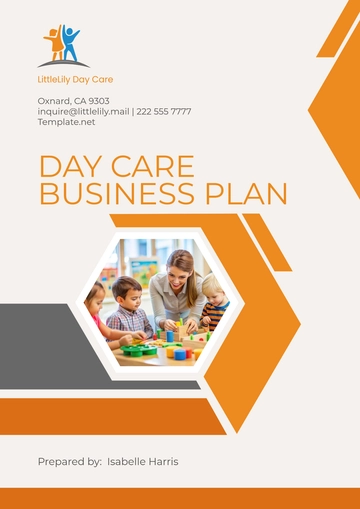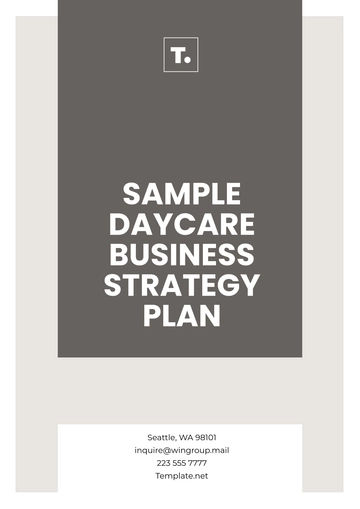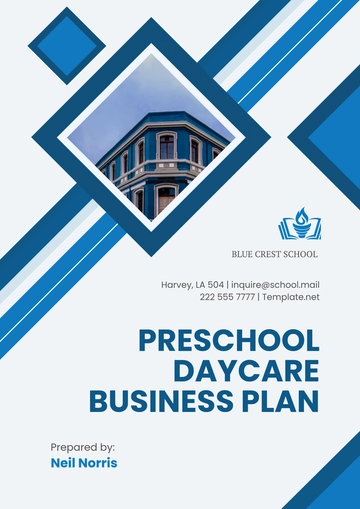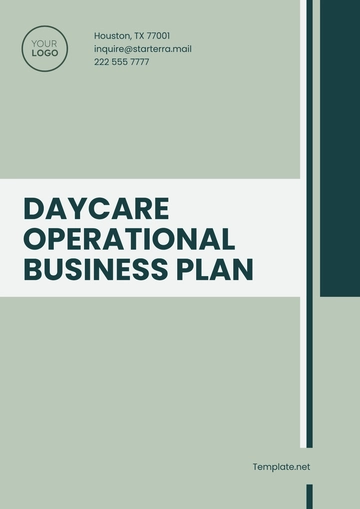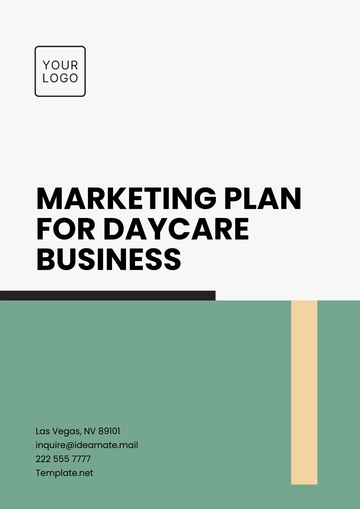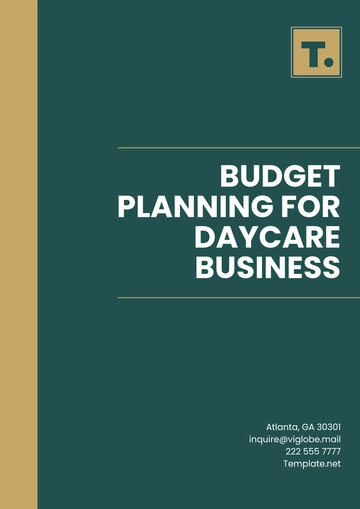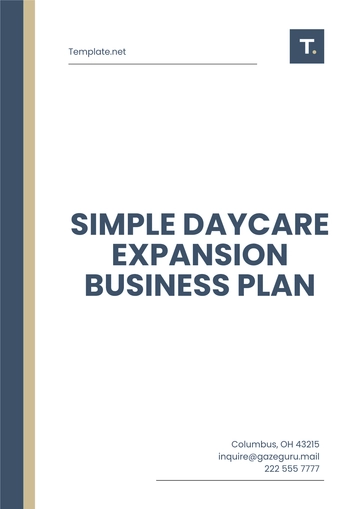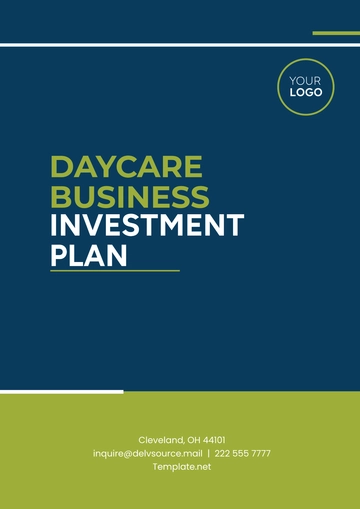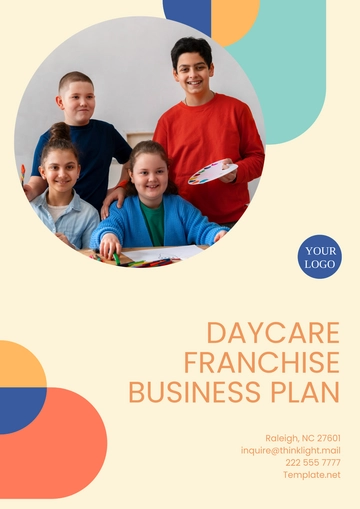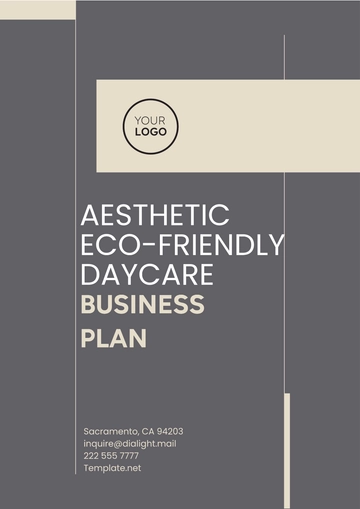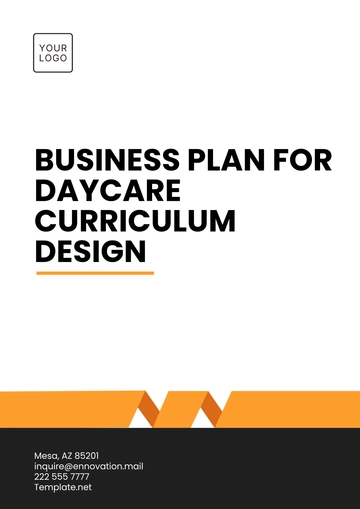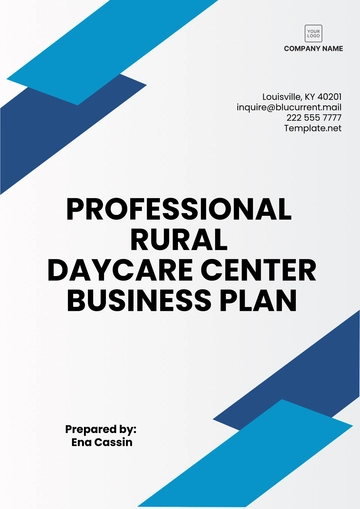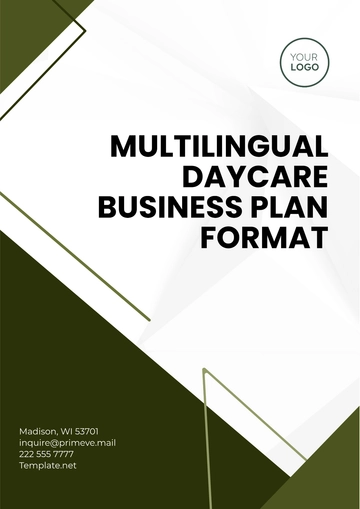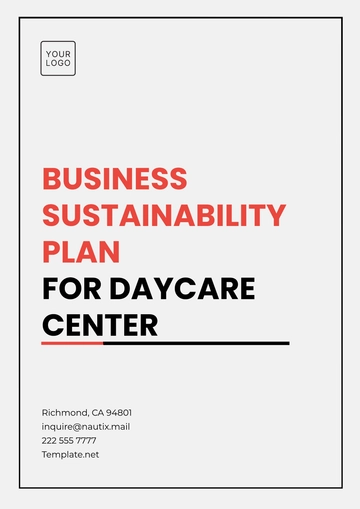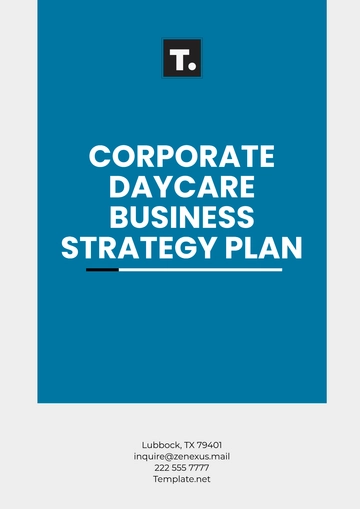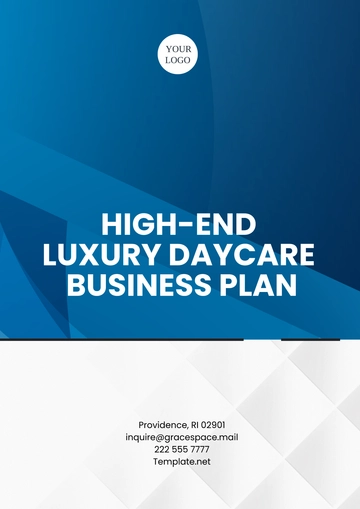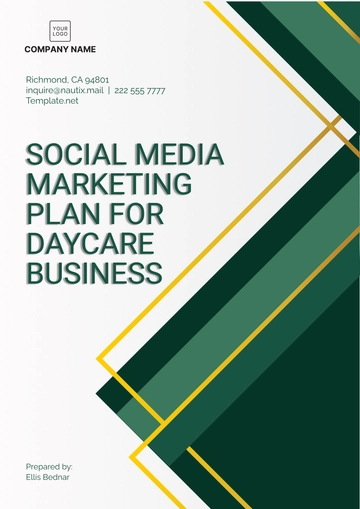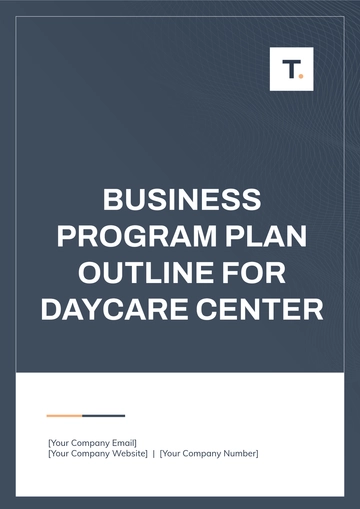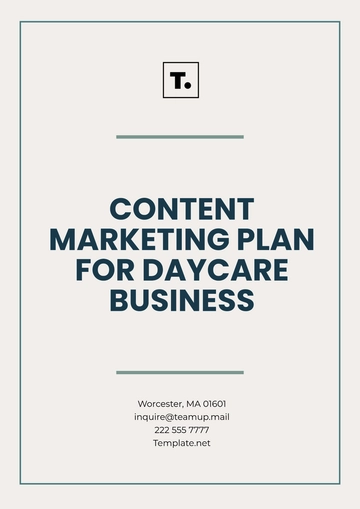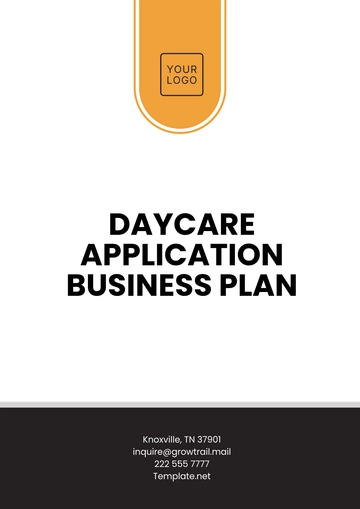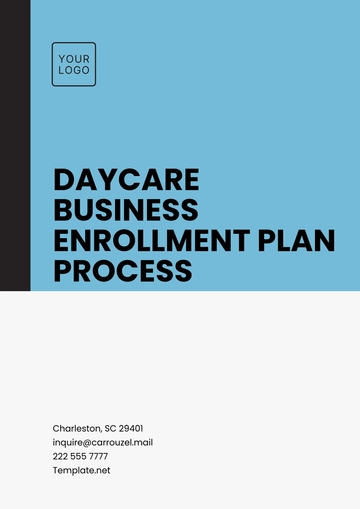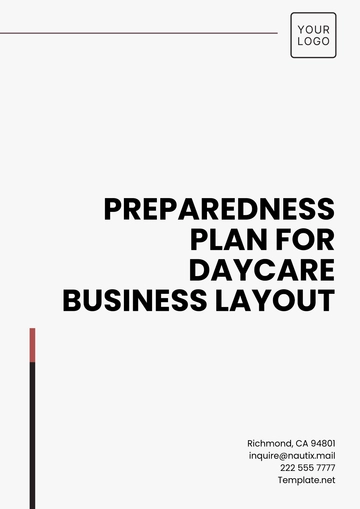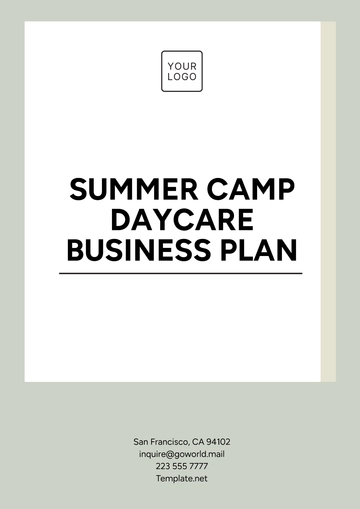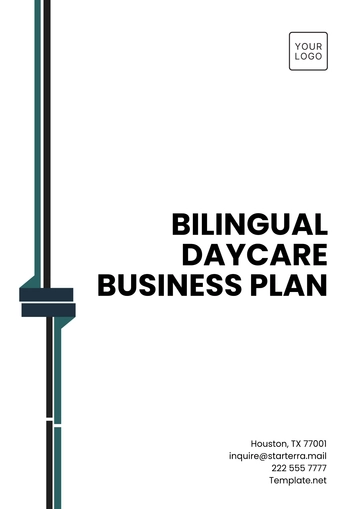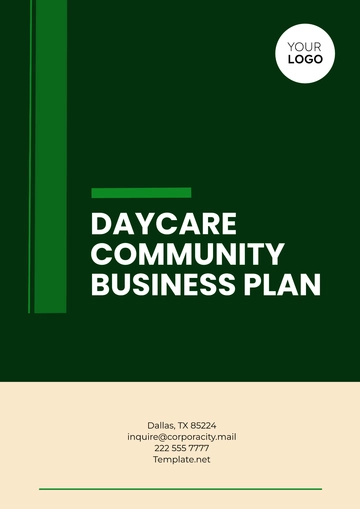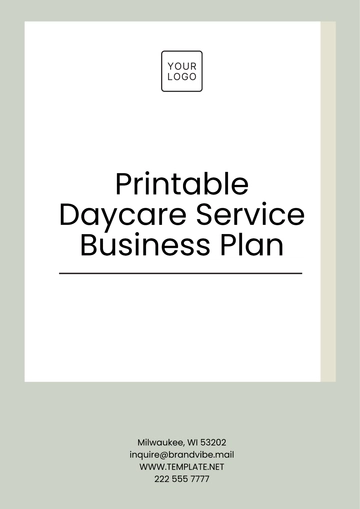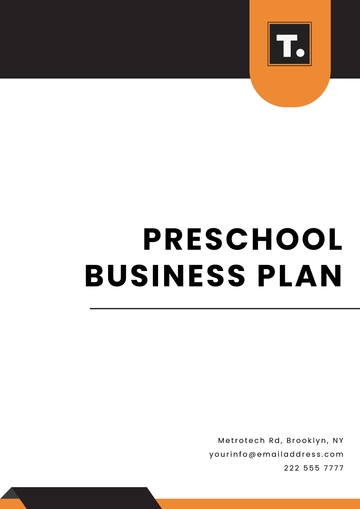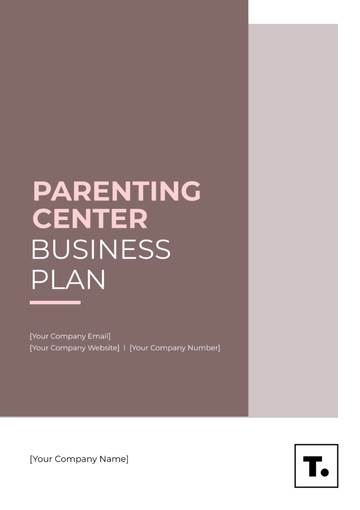Free Day Care Business Plan
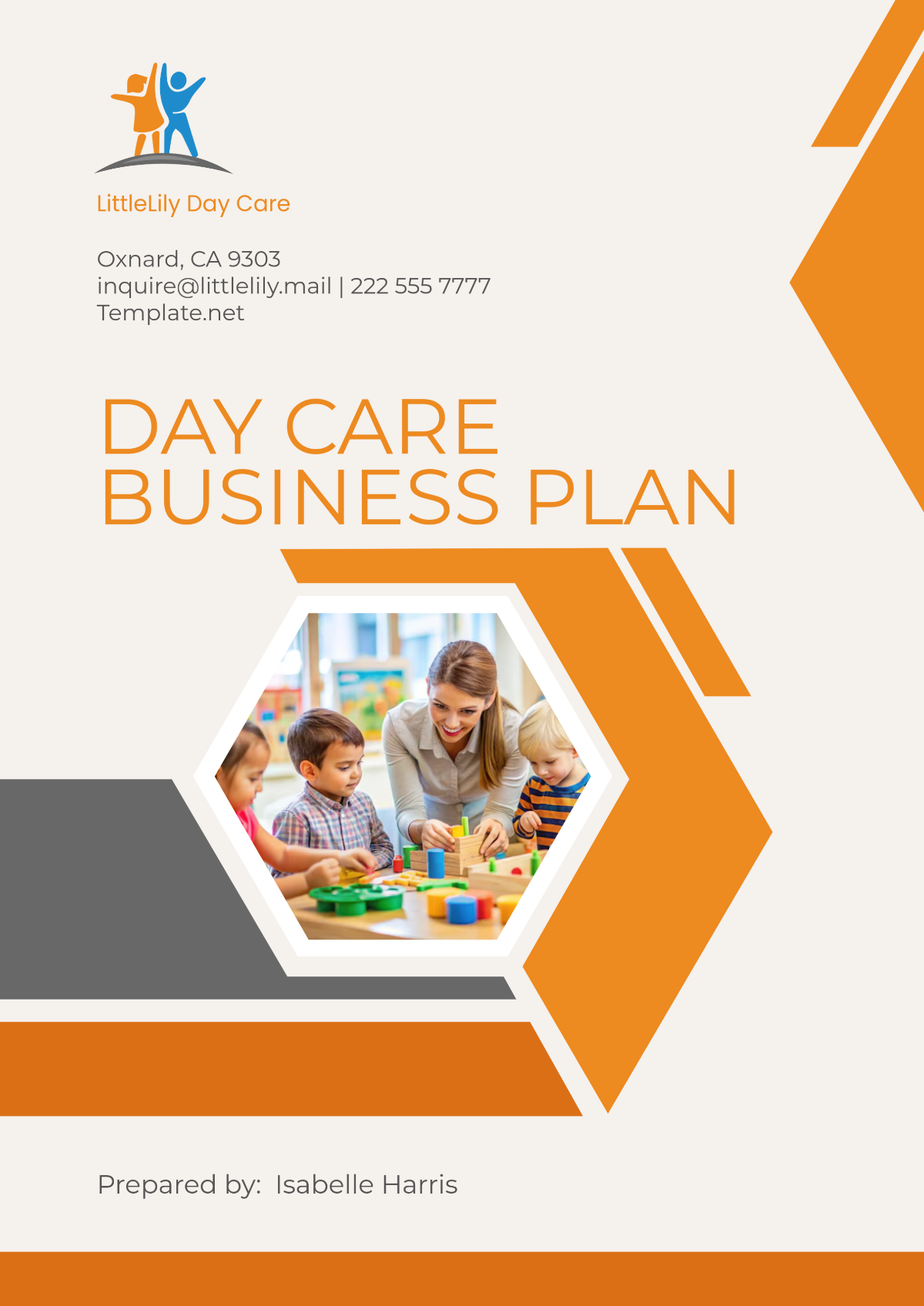
I. Executive Summary
A. Business Overview
[Your Company Name] is a premier daycare center located at [Your Company Address]. It is dedicated to providing a nurturing, safe, and stimulating environment for children aged 6 months to 5 years. Operating year-round, we offer diverse programs tailored to support each child's developmental milestones through play-based learning and structured activities.
B. Mission Statement
Our mission is to foster the holistic development of children by providing high-quality childcare and early education, empowering them to reach their full potential in a supportive and inclusive environment.
C. Business Objectives
Achieve a 90% enrollment rate by the end of our first year.
Establish a trusted and recognized brand within the community within the first 3 years.
Ensure a staff-to-child ratio that exceeds state requirements to provide personalized care.
II. Company Description
A. About the Company
Founded in 2050, [Your Company Name] was established to address the growing demand for reliable, high-quality childcare in the local community. We are committed to providing programs that balance educational development with social and emotional growth.
B. Services Offered
Full-Day Care: A full-day program designed for working parents, covering a comprehensive schedule from early morning until late afternoon.
Part-Time Care: A flexible part-time program designed for families who need care on a less frequent basis.
After-School Programs: Services for children who need after-school supervision, enrichment, and learning activities.
Summer Camps: Special seasonal programs offering fun, education, and physical activity during the summer months.
Special Needs Care: Tailored care plans and programs for children with special needs, providing a personalized approach to their developmental and educational needs.
C. Legal Structure
[Your Company Name] is registered as a Limited Liability Company (LLC), ensuring operational flexibility and legal protections for the business and its stakeholders.
III. Market Analysis
A. Industry Overview
The daycare industry is experiencing rapid growth, driven by increasing workforce participation and rising demand for early childhood education. As more parents seek high-quality, reliable childcare, the market for daycare services is expanding, offering ample opportunity for new providers.
B. Target Market
Our target market includes:
Working parents: Families where both parents are employed and need reliable, high-quality daycare services for their children.
Families in our local community: Families within the surrounding neighborhoods who are seeking educational and safe daycare environments.
Families with special needs children: Parents seeking specialized care for children with specific developmental or physical challenges.
C. Competitive Analysis
Our main competitors include:
Kidz Corner Day Care: Offers standard daycare services but lacks specialized programs for children with special needs.
Happy Tots Learning Center: Provides early education but has limited flexibility for part-time care.
Future Scholars Preschool: Focuses on preschool-aged children, offering a more structured academic environment but without the flexible schedules that working parents often require.
IV. Organization & Management
A. Organizational Structure
Position | Name | Responsibilities |
|---|---|---|
Owner/Director | [Your Name] | Overall management and strategic planning |
Lead Teacher | To Be Hired | Curriculum design and classroom supervision |
Assistant Teacher | To Be Hired | Assist in classroom activities |
Administrative Staff | To Be Hired | Enrollment and parent communications |
B. Staff Training
All staff members will be required to undergo the following training:
First Aid and CPR certification: Ensuring the safety of the children in our care.
Background checks: To ensure the safety and integrity of our staff.
Continuous professional development: Regular workshops and training sessions to stay updated on best practices in child care and education.
V. Services & Programs
A. Daily Schedule
Our daycare center offers a structured daily schedule that ensures children engage in a variety of activities to promote their physical, emotional, and cognitive development. The daily schedule includes:
Time | Activity | Description |
|---|---|---|
8:00 AM | Arrival and Free Play | Children arrive and engage in free play. |
9:00 AM | Morning Circle Time | Group activities with songs, stories, and discussions. |
10:00 AM | Snack and Outdoor Play | Snack followed by outdoor play. |
11:00 AM | Learning Activities | Educational activities like puzzles and arts and crafts. |
12:00 PM | Lunch | Balanced meals to fuel children for the afternoon. |
1:00 PM | Nap Time | Quiet time for rest and recharging. |
3:00 PM | Afternoon Snack | Light snacks before pick-up. |
4:00 PM | Guided Play | Structured playtime focused on skill-building. |
5:00 PM | Pick-up Time | Parents pick up their children. |
This timeline provides a visual overview of the typical daily schedule at the daycare. It gives parents a clear idea of how their child’s day will be structured.
B. Special Programs
We offer additional services to enrich the experience for both children and families:
Monthly Parent-Teacher Meetings: Regular meetings to discuss the child’s progress and any concerns.
Quarterly Developmental Assessments: Periodic evaluations to assess the children’s progress in key developmental areas.
Annual Family Events: Holiday celebrations, end-of-year parties, and community-building activities.
VI. Marketing & Sales Strategy
A. Marketing Plan
Our marketing strategies are designed to effectively reach our target market and attract new families:
Online Presence: We will maintain an engaging website and active social media profiles to attract local families and keep current parents informed.
Local Advertising: Collaborating with local businesses and community centers to increase awareness and gain referrals.
Promotions: Offering special discounts for new families and referral programs to encourage word-of-mouth marketing.
B. Sales Strategy
We will adopt a personalized approach to sales, including:
Personalized Tours: Offering tours of the facility for interested families to see the environment firsthand.
Free Trial Days: Giving potential clients a chance to experience our services before committing to a contract.
Referral Discounts: Providing incentives for existing families to refer new clients to our daycare center.
VII. Financial Plan
A. Start-Up Costs
The following is a breakdown of our start-up costs:
Expense Category | Amount |
|---|---|
Facility Lease | $50,000 |
Licensing and Permits | $5,000 |
Equipment and Supplies | $12,000 |
Initial Staffing | $22,000 |
Marketing | $6,000 |
Miscellaneous | $2,500 |
Total Start-Up Costs | $97,500 |
B. Revenue Projections
Our projected revenue and expenses for the first three years are as follows:
Year | Revenue | Expenses | Net Profit |
|---|---|---|---|
2050 | $210,000 | $160,000 | $50,000 |
2051 | $270,000 | $180,000 | $90,000 |
2052 | $320,000 | $200,000 | $120,000 |
VIII. Appendices
A. Appendix A: Certification Requirements
State Licensing
Health and Safety Inspection Reports
B. Sample Menu
B. Appendix B: Sample Menu
Day | Breakfast | Lunch | Snack |
|---|---|---|---|
Monday | Whole-grain cereal with milk | Turkey sandwich, vegetable sticks | Fruit snacks |
Tuesday | Oatmeal, yogurt | Chicken nuggets, mashed potatoes | Crackers, fruit |
- 100% Customizable, free editor
- Access 1 Million+ Templates, photo’s & graphics
- Download or share as a template
- Click and replace photos, graphics, text, backgrounds
- Resize, crop, AI write & more
- Access advanced editor
Nurture the future with Template.net's Day Care Business Plan Template. Tailored for compassionate entrepreneurs, it's fully editable and customizable to reflect your childcare philosophy. Harness the nurturing power of our AI Tool to refine your curriculum, enrollment strategies, and financial projections. Embark on a journey of shaping young minds with confidence and care.
You may also like
- One Page Business Plan
- Coffee Shop Business Plan
- Restaurant Business Plan
- Food Business Plan
- Real Estate Business Plan
- Executive Summary Business Plan
- Cover Page Business Plan
- Nonprofit Business Plan
- Daycare Business Plan
- Construction Business Plan
- Startup Business Plan
- Medical Business Plan
- Bakery Business Plan
- Service Plan
- Hotel Business Plan
- Catering Business Plan
- School Business Plan
- Healthcare Business Plan
- Transportation Plan
- Sports Plan
- Car Wash Business Plan
- Salon Business Plan
- Clothing Business Plan
- Farming Business Plan
- Boutique Plan
